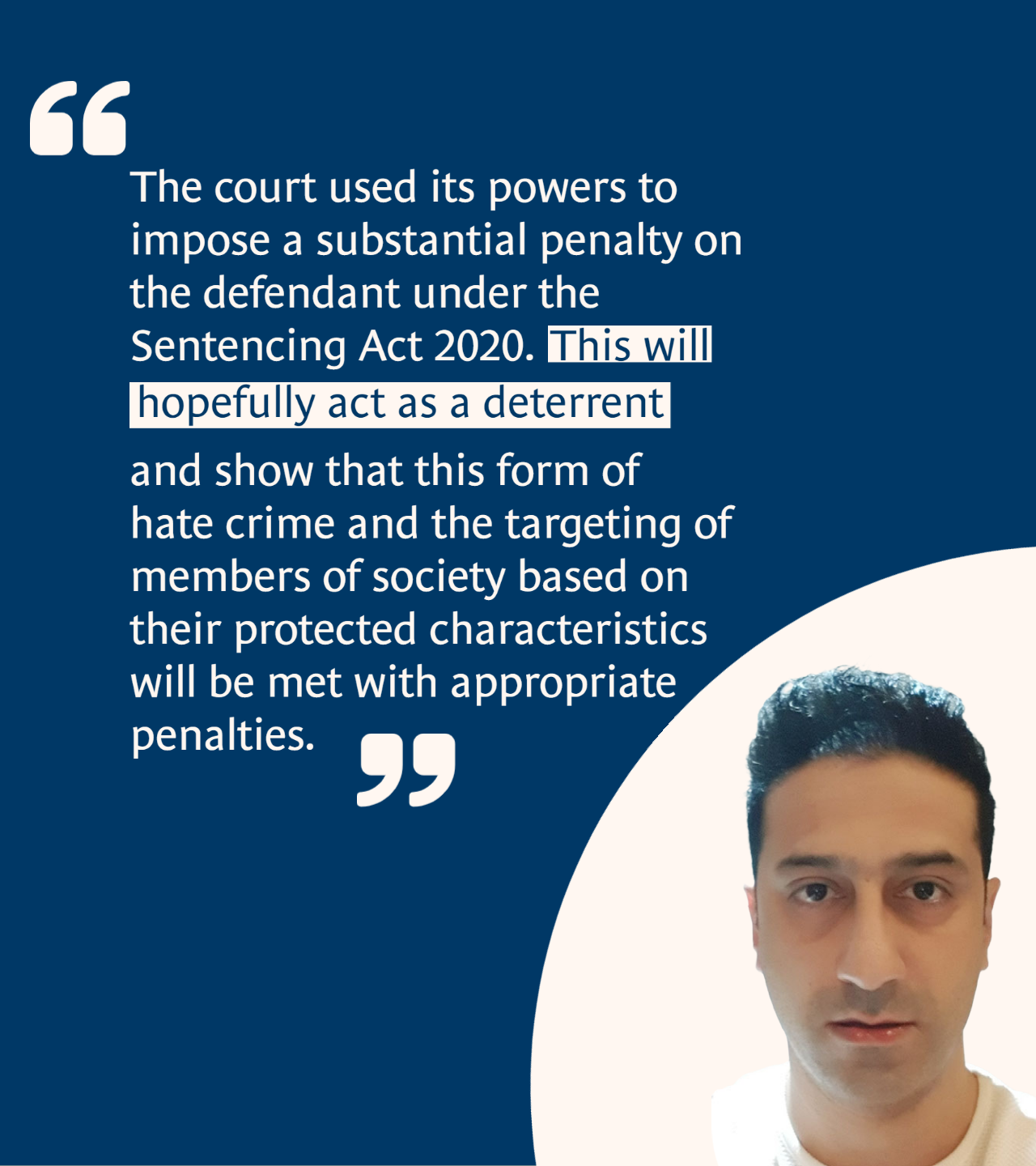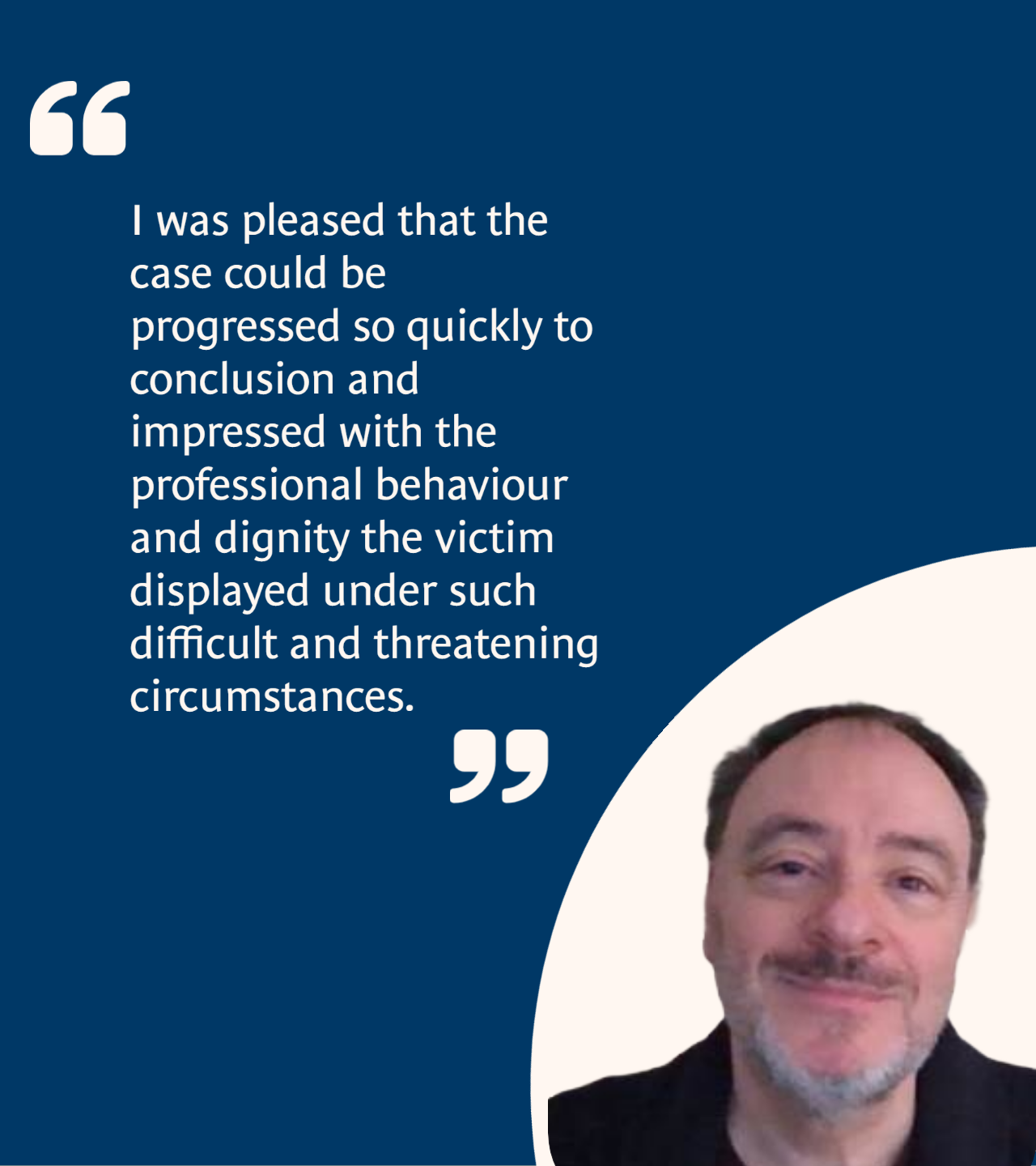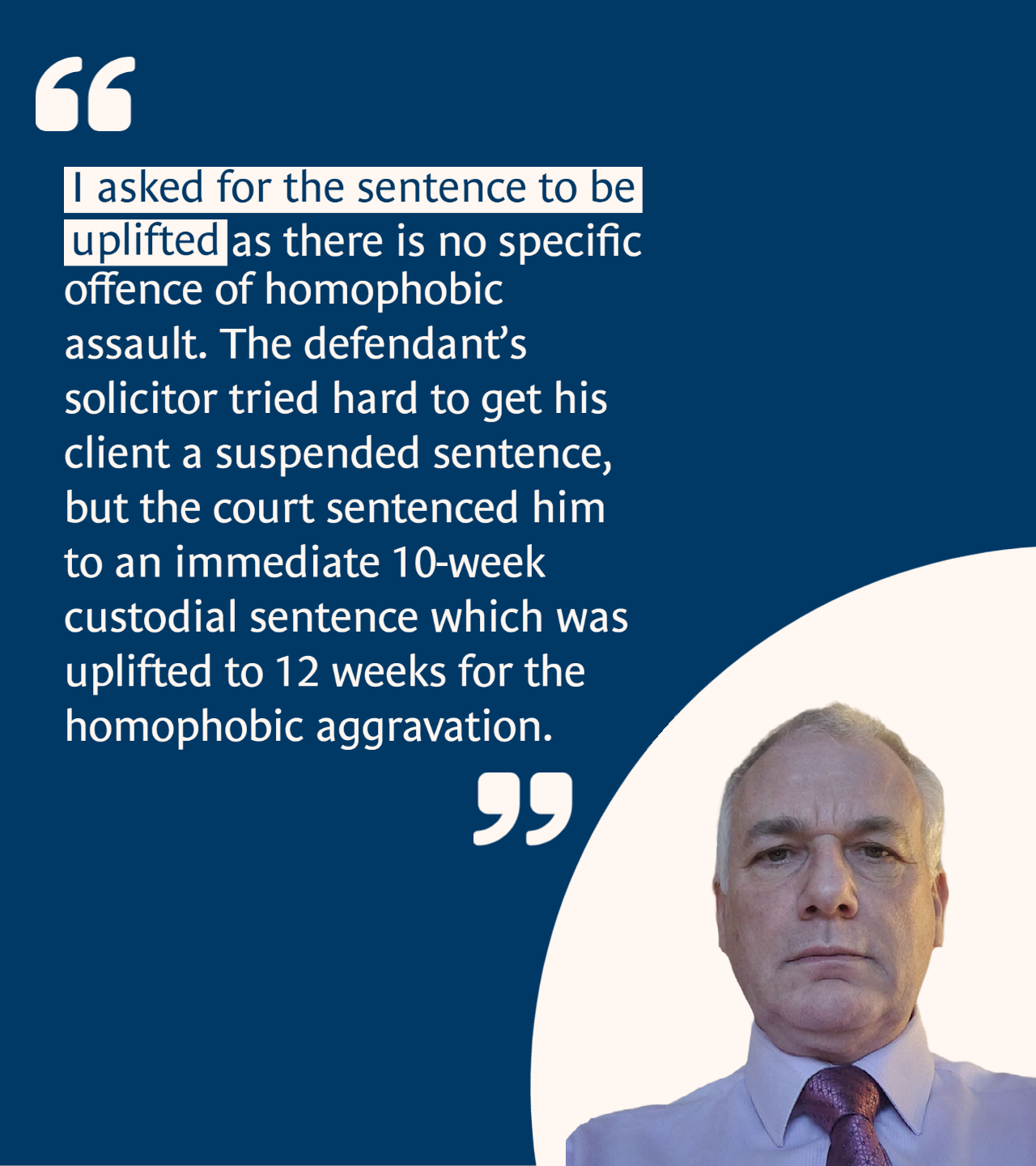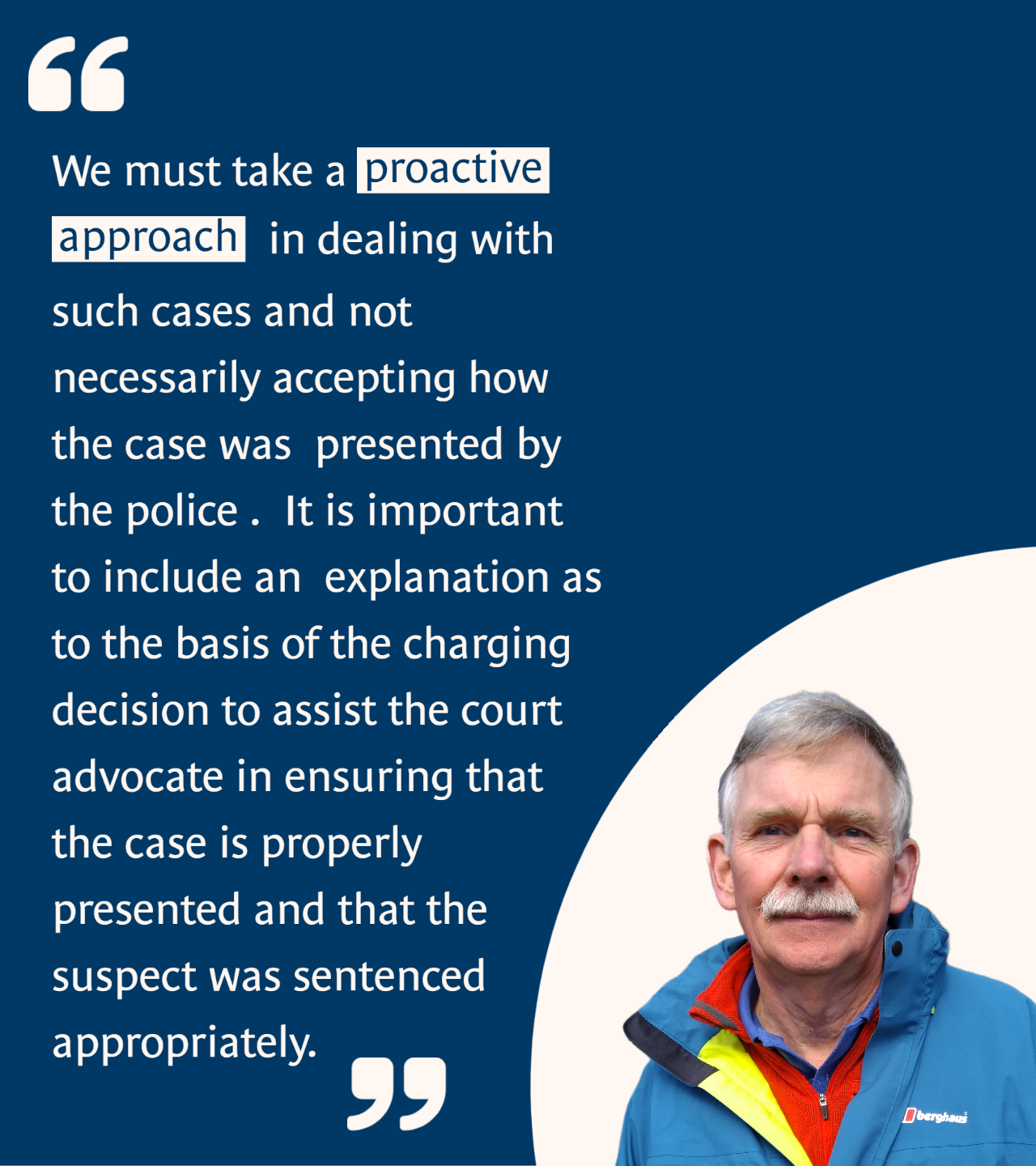Our recent hate crime convictions

Any crime can be prosecuted as a hate crime if the offender:
- demonstrated hostility towards one of the five characteristics protected by the hate crime legislation, or
- was motivated by hostility towards one of these characteristics
Offenders can receive longer sentences if they are convicted of a hate crime.

Homophobic harassment of a shop owner
In November 2022, a man was convicted of a homophobic public order offence, after he repeatedly used homophobic remarks and other derogatory and threatening comments to harass a shop manager.
The victim and her work colleague provided consistent statements, and the available CCTV footage supported their account of events. The police were authorised to charge the suspect with intentional harassment. Normally, the police would not require a CPS decision for a case of this nature. However, as it was a hate crime, the police were required to make a referral to the CPS under the Director’s Guidance.
The defendant plead guilty and was issued with an indefinite restraining order not to contact the victim and a 12-month exclusion requirement not to enter the shop. A 12-month community order was also imposed, along with a compensation award of £200 to the victim. This was uplifted from £100 since the case was a hate crime.
Abid Ali, Senior Crown Prosecutor CPS Direct:

Racially aggravated harassment of a restaurant worker
In January, a 39-year-old male repeat offender was convicted of racially aggravated intentional harassment. He pleaded guilty to being verbally abusive towards a 17-year-old black, female member of staff in a restaurant after drinking heavily.
The case was passed to CPS Direct and after reviewing the case evidence, the CPS decided to charge the offender. We make charging decisions for more serious offences, including hate crime offences and any offence which carries a sentence of more than six months in prison. For less serious offences, the police make the decision on whether to charge a suspect. CPS Direct deals specifically with cases where the suspect cannot be released on bail because they pose a risk of absconding or reoffending – as was the case in this example. He was facing a custodial penalty for the offence based on his criminal history and the Crown believed that if he were bailed, he might commit further offences.
The defendant had upset and harassed the victim through his words and behaviour. The offence showed the defendant had demonstrated hostility towards the victim based on her presumed ethnicity. The evidence therefore supported a charge of racially aggravated intentional harassment.
The defendant was charged and, with the weight of evidence against him, pleaded guilty. The defendant had two similar convictions from 2022 and the court decided to remand him in custody for a report prior to sentence. The defendant was sentenced to a term of 12 weeks’ custody.
Our prosecution guidance on racist hate crime explains how we prosecute offences like these to make sure we present the strongest possible case in court.
Paul Richards, Senior Crown Prosecutor, CPS Direct:

Homophobic harassment of a pub landlord
In January, a 36-year-old man was convicted of harassment, malicious communications, perverting the course of justice, and witness intimidation. He had tried to enter a pub he had previously been barred from after making vulgar comments about the landlord’s sexuality. Upon being turned away, he posted twice on Facebook, making threats towards the landlord.
We make all our decisions by following the two-stage test set out in our Code for Crown Prosecutors. The test asks two questions:
1. Is there enough evidence in this case to realistically get a conviction?
2. Is it in the public interest to prosecute this person?
All our prosecutors receive specialist training on hate crime to make sure that they understand the law and the context of their decision making, including the impact these crimes have on communities.
In this case our prosecutor carefully reviewed the evidence and decided that it met our test, so we authorised the police to charge the suspect.
He later pleaded guilty to a selection of charges on the day of the trial. He was sentenced to 32 months’ imprisonment, and as part of that sentence, he received 12 months for the homophobic messages. This was uplifted from nine months to mark the statutory aggravating factor of the hate crime.
“In terms of the case developing, the defendant targeted his attention on the corroborating witness (who was a friend of the Landlord in the original investigation). The witness alleged that he received threatening and abusive messages from a Facebook account created by the defendant. The witness further discovered that a fake Facebook profile had been set up in his name and used to make derogatory comments on other people’s profiles. The defendant even made a false police report against the witness attempting to suggest that the witness was threatening the defendant.”
Racially and religiously aggravated harassment of a taxi driver
In November 2022, a defendant was convicted of a racially aggravated public order offence, assault on a police officer and drug offences.
The defendant repeatedly harassed a taxi driver with racist and religious abuse. When the police were called, he kicked out at one of the officers. He was arrested and searched and found to be in possession of drugs.
As the case was a hate crime, the police had to request a charging authority from the CPS. Charges of a racially aggravated public order offence, assaulting an emergency worker and possession of drugs were authorised by a prosecutor at CPS West Midlands.
The defendant initially pleaded not guilty, and the court prosecutor made sure that a clear note of the trial issue was made. The case was then prepared for trial.
Before the trial date, the defence solicitors wrote to the reviewing lawyer and asked her to consider whether it was in the public interest to continue with the prosecution as the defendant was serving a 40-month custodial sentence for other matters.
The lawyer decided that it was in the public interest to continue to prosecute all matters, as the defendant had committed a hate crime and an offence against an emergency worker. The lawyer informed the defence solicitors of this, who then told the CPS the defendant intended to plead guilty to all charges. He entered guilty pleas at court via a TV link from prison.
The prosecutor on the 17 November informed the court of the circumstances of the offence. The defendant received an 18-week custodial sentence for the racially aggravated public order offence and was informed that the sentence had been increased by three weeks to reflect the hate crime. He received a further 12 consecutive weeks for the assault on the police officer, giving him a total sentence of 30 weeks. He received a concurrent two-week sentence for the drugs offence and was ordered to pay £75 to each victim.
Homophobic aggravated assault of a vulnerable adult
Recently, a man was convicted of homophobic aggravated assault by threats, after he harassed a vulnerable service user on multiple occasions.
As this was deemed to be a hate crime due to the nature of the threats being given referring to the presumed sexual orientation of the victim one of our CPS duty prosecutors took the call from the police and was responsible for authorising the charge after reviewing the evidence.
Gordon Grace, Senior Crown Prosecutor, CPS Direct:

Racially aggravated harassment towards a long term partner
Recently, a man was convicted of racially aggravated intentional harassment. The defendant domestically abused his long-term partner, and on one occasion, tried to break into her house and threaten her.
The defendant was charged with: assault occasioning actual bodily harm, making a threat to kill, two charges of sending an electronic communication with intent to cause distress or anxiety, and racially aggravated harassment, putting another in fear of violence.
With the weight of the evidence stacked against him, the defendant was convicted of all charges. Significantly, the defendant demonstrated hostility towards her based on his presumption of her racial identity.
The defendant was sentenced to five years in custody. He received two years in custody, concurrent, for the count related to the racially aggravated offence.
The prosecution wrote:
“… we are satisfied that the Learned Judge had clearly considered the racially aggravated element of the case, as outlined in the Sentencing Note and factored this into his decision-making when determining the length of sentence.
However, it would appear that the application of the uplift was not specifically stated when sentencing.
The Learned Judge immediately had the case re-listed at Wood Green Crown Court where he was by then, sitting, and before Counsels via CVP, he revised his approach to the sentencing and applied the uplift. The sentence was not increased, but the approach to the sentencing was clarified, announced in open court and recorded."
Claire Holder, Senior Crown Prosecutor, CPS London South:
“This case demonstrates the objective way in which racially aggravated offences can be charged when warranted by circumstances. It also highlights the importance of the sentencer announcing in open court the application of the uplift in sentence and the staged approach being adopted, thereby satisfying the requirements of the law.”
Racially aggravated domestic violence
Recently, a 28-year-old man was convicted of racially aggravated common assault after assaulting his father, sister and a police officer, and using racist slurs against his sister’s partner.
After the investigation, it was clear this offence was racially aggravated. The suspect harboured hostility towards the black partner of his sister.
All our prosecutors receive specialist training on hate crime to make sure they understand the law and the context of their decision making, including the impact these crimes have on communities.
In this case, our prosecutor carefully reviewed the evidence and decided that it met our test. We therefore authorised the police to charge the suspect with racially aggravated common assault.
The suspect was sentenced to 20 weeks’ custody for the racially aggravated offence. The sentence was uplifted from a community order, to reflect the severity of the hate crime.
Ian Ward, Senior Crown Prosecutor, CPS Direct
